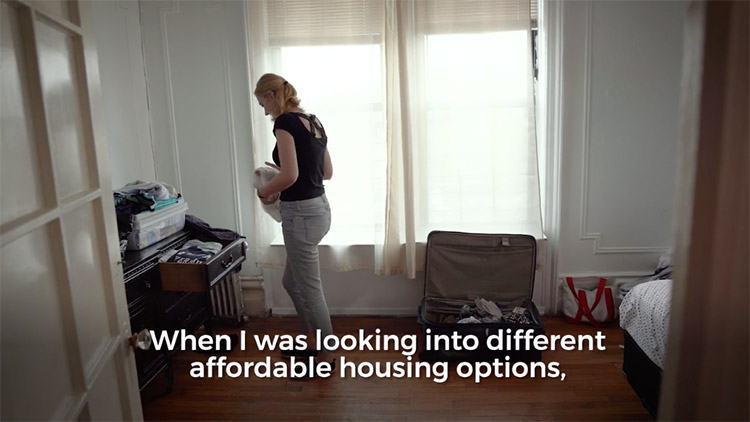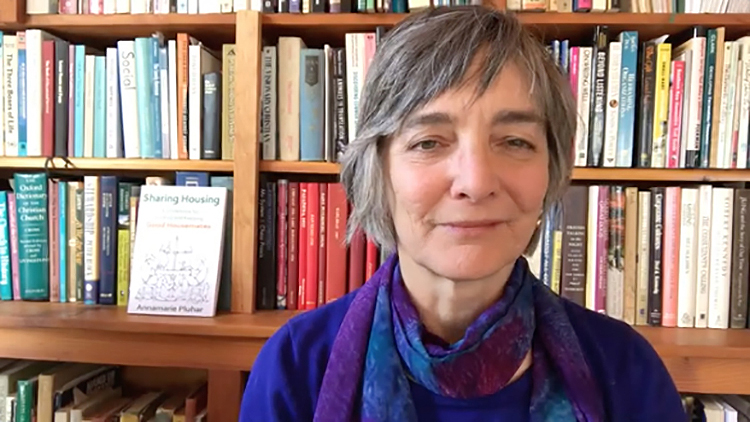ENTER YOUR EMAIL TO RECEIVE OUR WEEKLY NEWSLETTER
Home Sharing for Older Adults in NYC
Savvy solo New Yorkers are opting for home-mates, not room-mates.
By Sally Wendkos-Olds

From a video produced for New York Foundation for Senior Citizens.
. . . . . . . . . . . .
When a friend of singer Gloria Gaynor, 69, was going through a divorce, Gaynor, who had been living alone, invited her to move in with her. Now she says, “it’s wonderful for both of us to have the companionship—and to know we’re here for each other if something should happen and one of us would need the other.”
The number of New Yorkers living alone has grown steadily over the past century, according to the U.S. Census Bureau. In cities nationwide, half of the households are singles, and in some neighborhoods solo dwellers make up two-thirds of the population. Not surprisingly, many are women over 60.
Some older live-alones are happy with their living arrangements and enjoy their privacy and independence. They don’t have to account for what they do and when. They can relax at home in PJs all day or dress up and stay out all night. For others, though, solo living is lonely and isolating—and recent research, according to Richard S. Schwartz, MD, Harvard Medical School Professor of Psychiatry and co-author of The Lonely American: Drifting Apart in the 21st Century, has determined that loneliness is just as big a health threat as smoking. Another reality is the high cost of housing in New York City.
Furthermore, solo life in New York City can be hard to manage as we grow older. Fortunately for those of us who would like company and some assist with expenses and possibly chores, there’s help for finding a compatible someone to share your home.
Gaynor is now the spokesperson for the New York Foundation for Senior Citizens, which for almost 40 years has been helping older people find others to share their homes. Its program matches a participant with extra private space with an adult guest; at least one of the duo has to be 60 or over—or 55 if willing to share the home with a developmentally disabled adult.
For interested parties, the foundation conducts comprehensive background checks and interviews by its licensed social workers. Then it uses Quick-Match, a database with 31 lifestyle objectives to determine potentially compatible match-mates. These include whether the sharer smokes, has frequent visitors, has a pet—and how she or he feels about the other person’s particular activities. A social worker interviews both potential home-mates. And if they seem to be a good match, both produce personal and financial references and photo IDs, and they sign a written agreement. Then once the two have moved in together, a social worker follows up to assure that all is going smoothly. Because it’s funded by federal, state, city, and private sources, the Foundation’s program is free for all home-mates.
One recent match included a 57-year-old widower and a 71-year-old single woman, both of whom have cats. The two met and bonded over their shared love for animals, reading, and spending time outdoors. Another match-up paired a 28-year-old single male PhD history student from India with a 71-year-old retired copywriter who had lived in her two-bedroom Upper East Side apartment for almost 50 years. Their initial interview took place via Skype while the student was in India. Now the student helps the host with cleaning, meal preparation, and running errands. And both benefit financially.

Annamarie Pluhar from her video on SharingHousing.com.
. . . . . . . . . . . .
Those who want to do their own home-sharing research and planning can find help from Annamarie Pluhar, who has lived in shared housing for more than twenty years and has plumbed the experiences of other sharers. She offers useful examples and suggestions on her blog, sharinghousing.com, and in her very helpful book, Sharing Housing: A Guidebook for Finding and Keeping Good Housemates.
According to both Pluhar and the New York Foundation, financial reasons are the biggest driver for home-sharing. But a major motivation—or sometimes, a bonus—is the social connection of having another person in your home you can talk to, who has your back, and who can check to see if you’re okay. Another plus may include help with the ongoing maintenance of a home, whether it’s cooking, shopping, taking out the trash, or helping with child care. Assistance in the home can sometimes go far in reducing the guest’s rent. “Whatever arrangement you want,” writes Pluhar, “it is essential to be clear about this when advertising and interviewing potential housemates.”
This caution at the beginning is just as important when two friends decide to live together, as it is for two strangers. In fact, it is possibly even more so. Being someone’s friend is very different from being someone’s home-mate. How neat is your friend? How punctual in paying her bills? While issues like these may never come up in a friendship, they can spell success or disaster in a home-sharing situation.
In her book, Pluhar draws on her own and others’ real-life experiences to raise issues for would-be hosts and guests. She emphasizes the importance of two decisions for the host: which room to rent and how much to charge, and she offers criteria for making these decisions. The home-seeker has many decisions to make, from where she or he wants to be, how much she can afford to pay, and what she would like to have versus what is absolutely essential. Some of these issues may involve access to public transportation, a private bathroom, and kitchen privileges.
Host and guest need to think about age, gender, sexual orientation, and cultural preferences, and what—and whom—they can be comfortable with. Some of the very successful matches made by the New York Foundation have crossed such categories.
If you draw upon the resources of the Foundation or another agency specializing in helping prospective home sharers, you’ll benefit from the insights of a trained social worker. If you decide to go it alone, you’ll need to be your own advisor. First, you have to get the word out about what you want. You can place ads on Internet sites like craigslist.com (being careful to protect yourself against scammers). You can also advertise in local newspapers, teaching hospitals, neighborhood bulletin boards, and in college housing registries. Pluhar’s book lists several actual ads and critiques them in detail. Your first meeting should take place in a public location, when you can check the other person’s references. You should wait until the references check out before you make any commitments.
. . . . . . . . . . . .
Annamarie Pluhar’s book is available from Indiebound in paperback, Amazon in paperback and kindle versions, and the paperback can also be ordered from her website, www.sharinghousing.com, as can a workbook, made up of worksheets from the book. To contact the New York Foundation for Senior Citizens and find out about its completely free service, go to nyfsc.org or call 212-962-7559.
. . . . . . . . . . . .
Sally Wendkos Olds is an award-winning writer about intimate relationships, personal growth, and development throughout life. In addition to her classic The Complete Book of Breastfeeding, now in its fourth edition, she is the author or coauthor of ten other books and hundreds of articles in major publications.
You may enjoy other NYCitywoman articles by Sally Wendkos Olds:
NYC’s Organizations for Older Adults, Part 1
NYC’s Organizations for Older Adults, Part 2
How Seniors Share Experience and Wisdom
Saving Your Marriage After An Affair
Private Libraries in New York City
You’re Never too Old to Find New Friends











